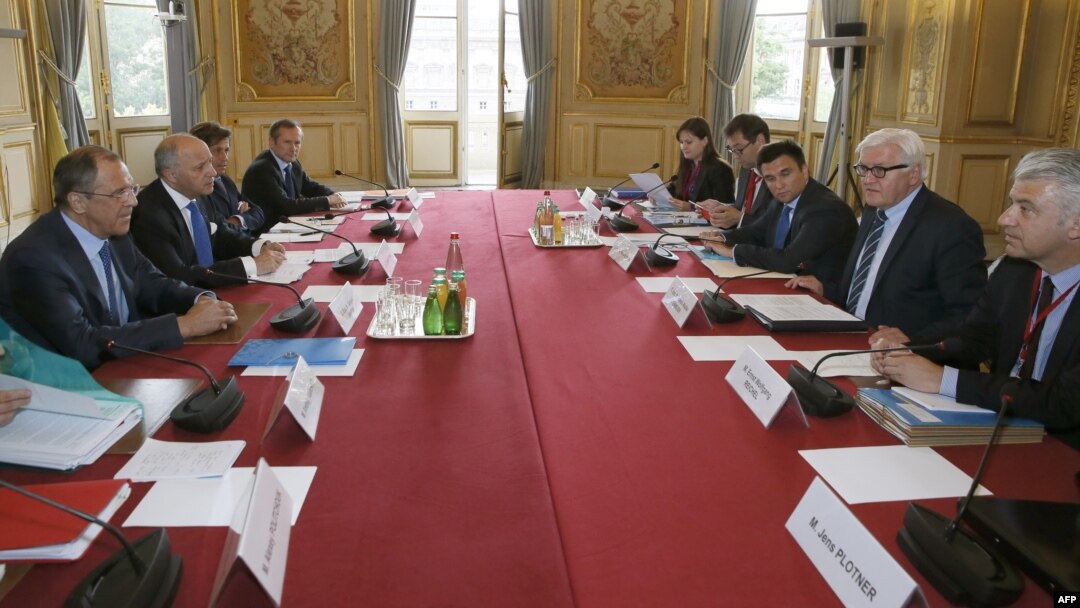Overnight talks on the Ukraine conflict ended late in Paris and with little sign of progress on a February peace deal agreed on in Minsk.
Though foreign ministers of France, Germany, Russia, and Ukraine underscored their support for the cease-fire plan, fighting between Russia-backed rebels and Ukrainian forces threatens to derail it.
German Foreign Minister Frank-Walter Steinmeier voiced hope the talks would help implement the truce.
"I hope that today in the discussion we had together we have cleared the way for an agreed cease-fire in the region,” he said. “We cannot reach it only on a political level. We now need military experts from the OSCE,” added he.
The Minsk deal envisions a truce and heavy weapons withdrawal followed by greater autonomy for rebel-held areas and elections under Ukrainian law.
The diplomatic efforts follow more frequent and widespread cease-fire violations. Leading up to the talks Tuesday, Ukrainian authorities accused rebels of conducting long-range artillery attacks.
Carnegie Moscow Center Director Dmitri Trenin says full implementation of the Minsk agreement before the end of the year is very improbable. He says those directly involved in the conflict have an interest in occasionally testing each others' military strength.
“I think we need to make sure that those directly opposing each other along the line of contact are brought under stronger control from the relevant authorities,” he said.
“I’m talking about the rebels in Donbas [name for Ukraine’s industrial east] who need to be more tightly controlled at the tactical level by the authorities in Moscow. But, I’m also talking about the Ukrainian formations on the opposite side of the line of contact who need to be brought under more stringent discipline enforced by both Kyiv and Washington,” Trenin added.
The Kremlin is widely believed to be supplying military support to the rebels, though it has consistently denied giving them weapons and claims any Russian troops in Ukraine are there as volunteers.
About 6,500 people, mainly civilians, have been killed and more than one million displaced by fighting in eastern Ukraine.
Monday, the European Union extended sanctions against Russia for supporting the rebels and annexing the Crimean peninsula. In response, Russian President Vladimir Putin said he would extend Moscow's countersanctions, banning food imports from the West, for one year.
Small steps
Some small steps were made in Paris at the political level as the ministers agreed to work toward demilitarizing Shyrokine, a small town that has seen an uptick in recent fighting.
Russia's Foreign Minister Sergei Lavrov said the diplomats agreed to increase monitoring of the frontline in east Ukraine.
“OSCE observers and representatives of the coordination center including Russian and Ukrainian military as well as representatives of Donetsk and Luhansk [rebels] will be involved in the process of the demilitarization of Shyrokine and in the process of monitoring of the front lines," he said.
The Organization for Security and Cooperation in Europe has hundreds of monitors working in Ukraine, but their movements are restricted by the warring parties. The Russia-backed rebels have been notably more aggressive in preventing monitoring.
OSCE monitor drones frequently have their signals scrambled over rebel territory. Also, the rebels and Russia refuse to allow access to most parts of their shared border.
The head of the Institute of Applied Political Research in Moscow, Grigoriy Dobromelov, says while some hawks on all sides want to perpetuate the conflict, the globally recognized leaders want to see it stopped.
“It is obvious already that for [Ukrainian President Petro] Poroshenko, and the majority of political figures in the Kremlin, the peaceful settlement in the East is a priority today,” he said. “The position of the Russian authorities that now declare that Donetsk and Luhansk are part of Ukraine and that Ukraine must take the responsibility for these territories, though observing the rights and demands of their populations, shows that Russia is not interested in escalating the conflict."
The Kremlin wants direct talks between Ukrainian authorities and rebels in southeastern Ukraine, known as the Donbas, but Kyiv has refused. Trenin says this is the main sticking point for political progress.
"... this is something that Kyiv has so far resisted because, from the Kyiv perspective, the rebels are terrorists," he said. "And, you do not negotiate with terrorists. I think that’s where we’re stuck.”
Meanwhile, representatives of the OSCE, Russia, Ukraine, and the rebels met in Minsk, but made less progress than the ministers in Paris.
OSCE special envoy Heidi Tagliavini said the negotiations, the fifth round of such talks, were not easy.
The Minsk talks centered on greater autonomy and elections in the rebel-held areas. Despite the Minsk agreement, the rebels have been demanding they be recognized with political independence from Kyiv.
Poroshenko voiced support Tuesday for decentralization of power in Ukraine, but rejected federalization.
As talks deadlock, Trenin says people all over Ukraine are tired of the fighting.
"People on both sides are getting more and more frustrated," he said. “But at this point it is not the people who have the last word, it’s still their leaderships. And, that’s.... I think this is stoking trouble for the future - on both sides frankly.”
A rare protest this month in rebel-held Donetsk saw hundreds of residents of frequently shelled neighborhoods demonstrating at rebel headquarters. They demanded rebel leaders move fighting from civilian areas so they can live in peace.


